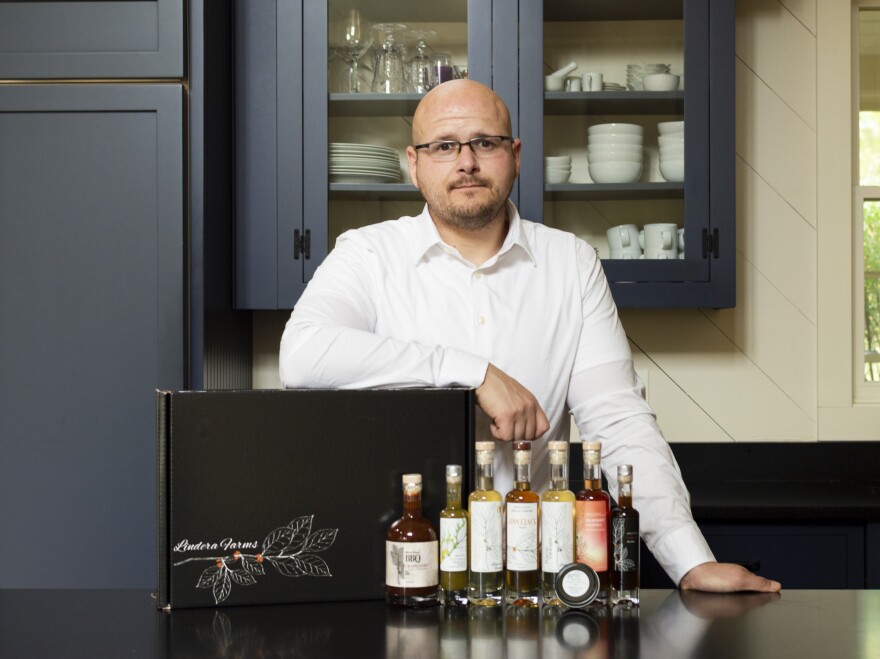Updated October 13, 2021 at 8:42 AM ET
Here's another unexpected example of how supply chains have been upended by the pandemic: Glass bottles used for everything from vinegar to pasta sauces are getting tied up in their own bottlenecks. That's driving prices higher, when you can get the bottles at all.
Just like many other industries struggling to secure supplies, producers of pasta sauce and high-end spirits are seeing the glass used in their humble containers tied up in massive cargo jams, and that's forcing them to either absorb the higher costs or pass them on to consumers.
Little relief appears to be in sight: The Labor Department reported Wednesday that consumer prices had risen 5.4% over the last 12 months — matching the highest level of inflation in more than a dozen years. Groceries and gasoline were significant drivers of the recent price increases.
Loading...
Businesses such as Lindera Farms in Delaplane, Va., have struggled to find bottles at any price.
This has been a banner season for the artisanal vinegar maker, but owner Daniel Liberson worries that unless an overdue shipment of glass bottles arrives from Italy in the next few weeks, he won't be able to package his product in time for the all-important Christmas season.
"There's a captain of a shipping vessel who holds my life in his hands," Liberson says. "Basically, if anything goes wrong with this shipment, I'm screwed."

Frustrations boil over as ships get stuck
The problems are not at home: Domestic glass manufacturers insist they're making as many bottles as ever.
"There is no shortage of the raw materials to make glass in this country," says Scott Defife, president of the Glass Packaging Institute. "The plants are all operating at full capacity to make new glass containers."
But 20% to 30% of the food and beverage bottles used in the U.S. are typically imported from Europe or Asia. Many of those bottles are hitting the same supply chain roadblocks that have tied up products ranging from memory chips to holiday toys.
What's more, since domestic glass plants are already running at full steam, customers whose imported bottles are delayed may have a hard time finding substitutes.
It's frustrating for Liberson, whose vinegar is made with hand-foraged wild onions and other fickle ingredients that have still proved easier to find this year than glass bottles.
"The whims of nature are less daunting than the whims of what is supposed to be an organized, structured supply chain," Liberson says with a rueful chuckle. "But here we are."

Stockpiling and the debate about whether to raise prices
In Rochester, N.Y., Paul Guglielmo has faced similar challenges obtaining 16-ounce jars for his namesake pasta sauce.
"We were told at least twice that a specific jar wouldn't be available for at least a month," Guglielmo says. "The strain it puts on us is, you get scared that you're not going to be able to find the materials. And so how do you react? Well, you react by buying more of it."
Just as panic purchases of toilet paper last year led to empty store shelves, that kind of stockpiling can make shortages worse, while also driving up the price.
Pint jars for pasta sauce that used to cost Guglielmo 33 cents apiece now cost 47 cents — a 42% increase before he's sliced his first tomato.
Thanks to a more efficient bottling process, Guglielmo was able to absorb some of that higher cost. But he also raised his own prices in the grocery store.
"I think the whole way down the supply chain, everyone makes that decision and they decide, are we going to eat all of this? Are we going to eat some of it? Are we going to pass all of it?" Guglielmo says.
Grocery prices have risen 4.5% over the past 12 months, including 1.2% between August and September alone.
As a "co-packer," Guglielmo not only makes his own pasta sauce, but also makes and bottles products for others. This gives him a bit more scale and bargaining power with suppliers.
Today his 6,000-square-foot warehouse holds far more empty jars than he ever would have purchased in the past. It's a kind of insurance policy that helps him sleep better at night, but it also ties up a lot of capital.
"I walk by pallets and pallets and pallets of unused glass," Guglielmo says. "We're going to use it. And I want it here. And it should be here. But I look at it and it's just a big pile of cash sitting there."

Buy early — if you even can
Given the uncertainty surrounding bottle supplies and the possibility of bare store shelves, shoppers are being warned not to wait until the last minute.
"We encourage anybody that wants a special bottle for Christmas to start shopping for it now, because you might have to make two or three trips to your local retailer," says David Ozgo, chief economist at the Distilled Spirits Council of the United States.
Still, shoppers seeking some products could go empty-handed no matter how early they show up.
Liberson, the small-scale vinegar-maker, still hopes his shipment of bottles from Italy arrives in late October or early November. That would leave him just enough time to package his product before the holidays, which typically account for about half of his annual sales.
For now, he's storing his vinegar in stainless steel vats and keeping his fingers crossed.
"Listen, I'm a neurotic Jewish guy," he says. "And I've got to tell you, heart-attack inducing is the word that comes to mind."
Copyright 2021 NPR. To see more, visit https://www.npr.org.



